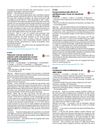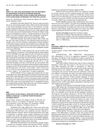 April 2017 in “European Psychiatry”
April 2017 in “European Psychiatry” Some antidepressants can cause emotional numbness and other unusual side effects.
 April 2017 in “European Psychiatry”
April 2017 in “European Psychiatry” An older woman had false beliefs after taking a depression medication, which stopped when she stopped the medication.
 March 2009 in “The Journal of Urology”
March 2009 in “The Journal of Urology” Shorter PSADT after prostate surgery is linked to higher risk of death.
 July 2020 in “Bioinformatics and Bioengineering”
July 2020 in “Bioinformatics and Bioengineering” Found key genes affecting hair loss, immune response, and skin development; more research needed for better treatments.
 991 citations,
January 2011 in “Nature Reviews Endocrinology”
991 citations,
January 2011 in “Nature Reviews Endocrinology” The document concludes that PCOS is a complex disorder caused by both genetic and environmental factors, affecting women's health in various ways, and requires personalized treatment.
 222 citations,
January 2014 in “International journal of reproductive medicine”
222 citations,
January 2014 in “International journal of reproductive medicine” Insulin resistance and obesity are key factors in the development and worsening of polycystic ovary syndrome, and lifestyle changes are important for managing it.
 153 citations,
March 2017 in “Endocrine”
153 citations,
March 2017 in “Endocrine” Male pattern baldness involves genetics, hormones, and needs better treatments.
 146 citations,
December 2016 in “Translational Andrology and Urology”
146 citations,
December 2016 in “Translational Andrology and Urology” Hormone therapy is essential for transgender individuals but requires careful management due to possible metabolic effects.
 121 citations,
April 2008 in “The Journal of Clinical Endocrinology & Metabolism”
121 citations,
April 2008 in “The Journal of Clinical Endocrinology & Metabolism” Insulin sensitizers may slightly reduce hirsutism but are less effective than other treatments.
 93 citations,
February 2015 in “Journal of Investigative Dermatology”
93 citations,
February 2015 in “Journal of Investigative Dermatology” Oxidative stress affects hair loss in men with androgenetic alopecia.
 86 citations,
July 2020 in “International Journal of Molecular Sciences”
86 citations,
July 2020 in “International Journal of Molecular Sciences” Activating the Wnt/β-catenin pathway could lead to new hair loss treatments.
 82 citations,
May 2016 in “Best Practice & Research in Clinical Obstetrics & Gynaecology”
82 citations,
May 2016 in “Best Practice & Research in Clinical Obstetrics & Gynaecology” The conclusion is that managing androgen excess requires long-term treatment, including hormonal contraceptives and androgen blockers, with follow-up after six months.
 81 citations,
March 2009 in “Seminars in Cutaneous Medicine and Surgery”
81 citations,
March 2009 in “Seminars in Cutaneous Medicine and Surgery” Effective hair loss treatment in women requires correct diagnosis and can include medications like minoxidil, antiandrogens, and treatments for underlying conditions like PCOS.

research Acne
81 citations,
January 2002 in “American journal of clinical dermatology” Hormonal treatments can help with acne, especially in women, by lowering androgen levels or blocking their effects.
 70 citations,
April 2013 in “Endocrine”
70 citations,
April 2013 in “Endocrine” Lifestyle changes improve metabolism and fertility in overweight PCOS patients; anti-obesity drugs show potential but need more research.
 69 citations,
December 2005 in “Nature Clinical Practice Endocrinology & Metabolism”
69 citations,
December 2005 in “Nature Clinical Practice Endocrinology & Metabolism” Blocking the enzyme 11β-HSD1 might help treat obesity and metabolic issues.
 62 citations,
December 2015 in “Clinical Medicine”
62 citations,
December 2015 in “Clinical Medicine” Improving insulin sensitivity and weight loss can help manage polycystic ovary syndrome (PCOS).
 61 citations,
June 2016 in “Clinical Medicine”
61 citations,
June 2016 in “Clinical Medicine” PCOS is often linked to insulin resistance and obesity, and weight loss can improve symptoms.
 60 citations,
April 2010 in “General and Comparative Endocrinology”
60 citations,
April 2010 in “General and Comparative Endocrinology” Fadrozole and finasteride change gene expression related to sex hormones and thyroid hormones in frog larvae development.
 57 citations,
January 1995 in “The American journal of medicine”
57 citations,
January 1995 in “The American journal of medicine” Oral contraceptives help treat hyperandrogenic disorders, improving symptoms like excessive hair and acne.
 54 citations,
September 2013 in “Fertility and Sterility”
54 citations,
September 2013 in “Fertility and Sterility” Finasteride can reduce fertility in some men, but stopping it increases sperm count.
 47 citations,
June 2016 in “JAMA Dermatology”
47 citations,
June 2016 in “JAMA Dermatology” Men with early hair loss have similar hormone levels to women with PCOS, possibly increasing risk of obesity and heart issues.
 42 citations,
July 2015 in “Journal of The American Academy of Dermatology”
42 citations,
July 2015 in “Journal of The American Academy of Dermatology” The conclusion is that oral contraceptives and antiandrogens can treat hirsutism and acne in women with cutaneous hyperandrogenism, but more research is needed for effective treatments, especially for hair loss.
 41 citations,
November 2003 in “Annals of the New York Academy of Sciences”
41 citations,
November 2003 in “Annals of the New York Academy of Sciences” Male hormones, or androgens, affect women's health in areas like mood and bone density, and hormone replacement therapy using antiandrogenic progestogens can improve mood disorders and alertness in menopausal women.
 40 citations,
December 2006 in “Journal of The European Academy of Dermatology and Venereology”
40 citations,
December 2006 in “Journal of The European Academy of Dermatology and Venereology” Minoxidil helps hair regrowth in traction alopecia.
 39 citations,
November 2015 in “Nanomedicine”
39 citations,
November 2015 in “Nanomedicine” Improved Finasteride delivery for hair loss treatment.
 38 citations,
November 2016 in “Aaps Pharmscitech”
38 citations,
November 2016 in “Aaps Pharmscitech” Nanoparticles with more oleic acid improved the delivery and stability of the drug spironolactone.
 37 citations,
January 2019 in “Dermatologic Therapy”
37 citations,
January 2019 in “Dermatologic Therapy” A dietary supplement with Boswellia serrata, Curcuma longa, and Vitis vinifera showed potential improvement in hair health for telogen effluvium patients, but more research is needed.
 37 citations,
September 2007 in “International Journal of Pharmaceutics”
37 citations,
September 2007 in “International Journal of Pharmaceutics” PPCM microspheres allow controlled finasteride release over 24 hours.
 36 citations,
October 2009 in “Journal of Investigative Dermatology”
36 citations,
October 2009 in “Journal of Investigative Dermatology” Dihydrotestosterone can be made from dehydroepiandrosterone in skin cells without needing testosterone.






























